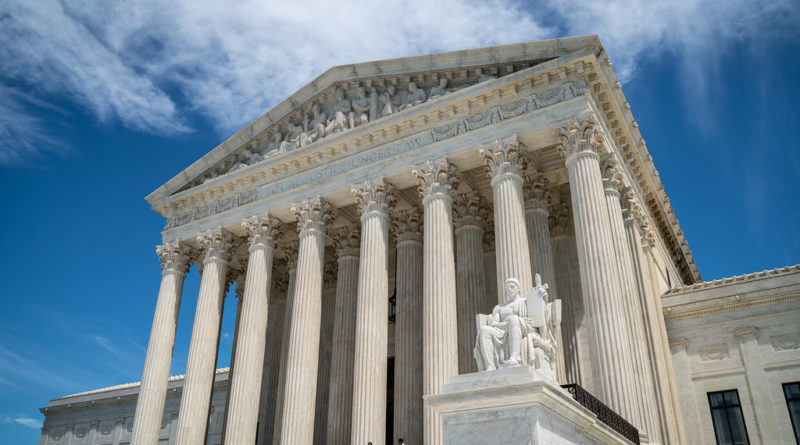SCOTUS overturns Roe v. Wade nearly 50 years after the court expanded abortion access
The Supreme Court Building in Washington D.C.
Zoë Hill | Print Editor-in-Chief
Lucinda Judd | Business Manager
The Supreme Court of the United States overturned Roe v. Wade in a 6-3 decision Friday, allowing states to restrict access to abortion.
“It is time to heed the Constitution and return the issue of abortion to the people’s elected representatives,” Justice Samuel Alito said in the majority opinion.
All three liberal justices of the court, Stephen Breyer, Sonia Sotomayor and Elena Kagan, voted to uphold the Roe decision.
“With sorrow – for this Court, but more, for the many millions of American women who have today lost a fundamental constitutional protection – we dissent,” they wrote in a joint dissenting opinion.
The landmark 1973 decision signified that the court generally supported a woman’s right to have an abortion and afforded them constitutional protections on the basis of privacy. Roe changed the way states could regulate abortions, which expanded a woman’s right to choice at the national level.
The Dobbs v. Jackson Women’s Health Organization case decided Friday challenged Roe by upholding a Mississippi law to criminalize abortion nearly two months earlier than the federal precedent set by Roe.
A draft of the majority opinion was leaked to POLITICO on May 2 revealing the court’s impending decision to overturn Roe. Chief Justice John Roberts confirmed the authenticity of the draft the next day and directed the Marshal of the Court to launch an investigation into the leak.
“Roe was egregiously wrong from the start… “We hold that Roe and Casey must be overruled,” Alito said in the draft. “It is time to heed the Constitution and return the issue of abortion to the people’s elected representatives.”
In the draft majority opinion, Alito said the Roe decision deepened national division and was “far from bringing about a national settlement.” According to the Pew Research Center, 61% of Americans believe abortion should be legal in all or most cases, with 37% believing it should be illegal in all or most cases.
The court’s decision placed the legality of abortion in the hands of state governments. Thirteen states have “trigger laws” which restrict abortion rights and will go into effect in 30 days. Arkansas, Idaho, Kentucky, Louisiana, Mississippi, Missouri, North Dakota, Oklahoma, South Dakota, Tennessee, Texas, Utah and Wyoming all enacted various forms of trigger laws Tuesday following the court’s decision.
All 13 states have made those that perform a criminal abortion punishable with a felony, including possible jail time and a fine. This would allow some states to charge the pregnant individual if they attempted a procedure without medical assistance. Kentucky, Tennessee, Louisiana, Missouri, Arkansas, Texas, Oklahoma, Wyoming, and Idaho’s laws have clauses protecting the pregnant individual from this possibility though the language differs from state to state.
The severity of penalties if found guilty, ranges from receiving up to 14 years of jail time in Wyoming to up to two years in Louisiana. The classification of the felony charge depends on the state.
The law in Texas provides presents different charges for an attempted abortion, and one for “if an unborn child dies as a result.” An attempt results in a 2nd-degree felony charge and a successful abortion will result in a first-degree felony charge.
All states have stated that an abortion may occur if it is necessary to save the life of the pregnant person, not including reasons pertaining to mental health. Out of the states that have enacted trigger laws, Utah, Idaho, Wyoming, and Oklahoma are the only ones that make exceptions for cases of rape and incest. In Idaho, the rape or incest must first be reported to authorities prior to seeking an abortion.
Abortion rights in 16 states— California, Colorado, Connecticut, Delaware, Hawaii, Illinois, Maine, Maryland, Massachusetts, Nevada, New Jersey, New York, Oregon, Rhode Island, Vermont and Washington— and the District of Columbia have been codified and will be protected.
Thirteen states, including Ohio, will likely pass legislation to restrict abortion access given current abortion laws in their states. Before the decision, abortion was legal in Ohio up to 20 weeks post-fertilization, except in the city of Lebanon where a 2021 city ordinance banned all abortions.
Ohio abortion law will now follow the Human Rights and Heartbeat Protection Act, also known as the Heartbeat Bill. This law criminalizes abortions when a fetal heartbeat can be detected— typically around six weeks post-fertilization.
For more news, like Flyer News on Facebook and follow us on Twitter (@FlyerNews) and Instagram (@flyernews).

